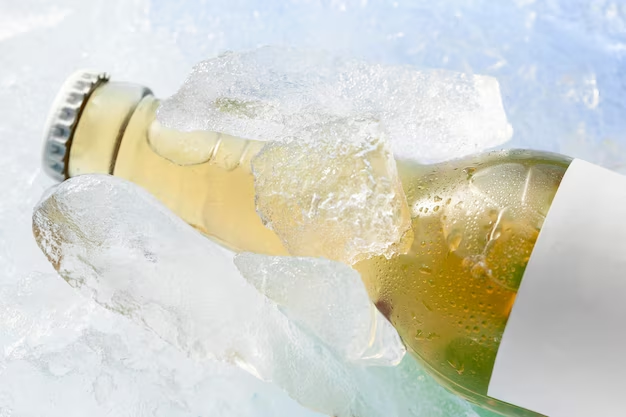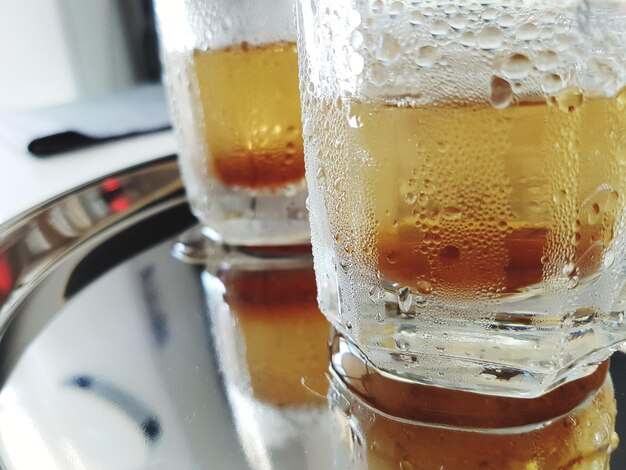Have you ever pondered the question, “At what temperature does beer freeze?” You’re not alone in your curiosity. This inquiry is prevalent among casual drinkers and aficionados alike. Understanding the freezing point of beer isn’t just a fun fact; it’s crucial knowledge for anyone who enjoys an icy cold beverage. Let’s explore this frosty aspect further to determine at which specific temperature beer freezes solidly.
The Freezing Point of Beer

To begin, let’s address the pressing inquiry: what temperature does beer solidify? It is not as straightforward as it may seem. Generally, the freezing point of beer varies from 28°F (-2°C) to 30°F (-1°C). Nevertheless, this range lacks precision due to multiple influencing elements including percentage of alcohol content within a brew and its corresponding style along with supplementary ingredients.
- Alcohol Content: The alcohol content of beer plays a crucial role in determining its freezing temperature. A higher concentration of alcohol leads to a lower point at which the liquid solidifies. Thus, light beers with lesser amounts of alcohol tend to freeze nearer to the upper limits within their freezing range.
- Beer Style: The composition of beer styles can affect their freezing temperature, meaning that different types may freeze at varying temperatures. Compared to a lager, for example, the freezing point of a stout could be quite dissimilar.
- Additional Ingredients: Other additives, such as sugars and salts, can also impact the freezing point of beer.
Why Understanding the Freezing Point is Crucial
Comprehending the freezing point of beer is vital and carries immense importance in diverse aspects related to beer-related pursuits. Let’s delve into an elaborated explanation as to why having knowledge about the freezing point of beer holds such a crucial significance:
| Reasons for Understanding the Freezing Point of Beer | Description |
| Safety in Storage | It is crucial to understand the freezing point when storing beer, especially in colder regions. Beer includes water which expands upon solidifying- a commonly-known fact. Subsequently, if left frozen inside bottles, this expanding ice can exert tremendous force on glass surfaces and resultantly shatter them; thus making it an unsafe scenario for any individual present nearby. To avoid such untoward instances while managing your favorite beverages’ storage lessons learned from knowing about the freezing points become vital. |
| Preserving Taste and Quality | Freezing beer not only puts it at risk of bottle breakage, but also negatively affects its taste and quality. Beer is a symphony of flavors and aromas that brewers meticulously balance in every batch they produce. Freezing disrupts this delicate equilibrium by forming ice crystals that can damage the proteins and hop compounds found in beer, altering both its texture and flavor. It’s important to know precisely when your favorite brew freezes so you can preserve the intended flavor profile for optimal enjoyment later on. |
| Home Brewing Precision | Having a deep love for home brewing, comprehending the freezing point of beer is a fundamental element in perfecting this craft. It facilitates accurate temperature management during fermentation to ensure that yeast activity and required taste profiles are achieved effectively. Moreover, being knowledgeable about the freezing point aids decision-making regarding ideal long-term storage conditions for your homemade brews- which means you can guarantee they will turn out exactly as intended and share them with pride amongst loved ones! |
| Commercial Brewing Considerations | Commercial brewers can enhance the quality of their products by comprehending the freezing point of beer, as it is necessary to keep a check on and regulate temperatures while brewing, fermenting, and storing. The precision required in maintaining optimal temperature levels cannot be ignored since any deviation from these ranges could impact the final product. Having knowledge about the freezing point proves useful for professional breweries who can intelligently tweak their processes to produce better products that meet customer expectations consistently. |
The Science Behind Freezing Beer

One of the key factors that determine at what temperature beer freezes is its alcohol content. Alcohol has a lower freezing point compared to water, which means that it remains in a liquid state at lower temperatures than pure water. Consequently, the more alcohol there is in the beer, the lower the temperature required to freeze it. This principle is essential in understanding why different types of beers freeze at varying temperatures.
Freezing Temperatures of Different Beers
The freezing point of beer depends on several factors, with alcohol content being one of the primary ones. Here’s a breakdown of the freezing temperatures of various types of beers:
Table: Freezing Temperatures of Different Beers
| Type of Beer | Alcohol Content | Approximate Freezing Temperature |
| Light Beer | 3-4% ABV | Around 28°F (-2°C) |
| Regular/Standard Beer | 4-5% ABV | Approximately 24°F (-4°C) |
| Craft Beer | 5-7% ABV | Between 20°F and 23°F (-6°C to -5°C) |
| Strong Beer | 7-12% ABV | Typically below 20°F (-6°C) |
| Ice Beer (Eisbock) | 12-15% ABV | As low as 5°F (-15°C) |
Note: ABV stands for Alcohol by Volume, which indicates the alcohol content in a beverage as a percentage of the total volume.
From the table above, you can see that light beers with lower alcohol content will freeze at temperatures just below the freezing point of water (32°F or 0°C), while strong beers with higher alcohol content can freeze at much lower temperatures.
Effects of Freezing on Beer
Freezing beer can have a significant impact on its quality. When beer freezes, the water content within it forms ice crystals, while the alcohol remains in a liquid state. This separation can lead to several undesirable outcomes:
- Altered Flavor: The formation of ice crystals can concentrate the beer, leading to changes in flavor. Some beers may taste sweeter or more bitter after freezing due to this concentration.
- Texture Changes: The texture of the beer can also be affected, making it less smooth and potentially more syrupy in consistency.
- Carbonation Issues: Freezing can disrupt the carbonation in beer. When ice crystals form, they can push out carbon dioxide, leading to a flat and less effervescent beer when thawed.
- Haze Formation: Freezing and thawing beer can result in the formation of haze or cloudiness in the liquid, further affecting its visual appeal.
Preventing Your Beer from Freezing
Now that we know at what temperature beer freezes, let’s explore effective methods to prevent it. Here are some practical tips to ensure your beer remains liquid even in chilly conditions:
Proper Storage Temperature
One of the most crucial aspects of preventing beer from freezing is maintaining the correct storage temperature. The recommended range for beer storage to prevent freezing is between 35°F to 40°F (1.7°C to 4.4°C). This range is slightly above the freezing point of most beers, providing a buffer to ensure they remain liquid.
| Beer Type | Recommended Storage Temperature |
| Lager | 35°F to 40°F (1.7°C to 4.4°C) |
| Ale | 35°F to 40°F (1.7°C to 4.4°C) |
| Stout | 35°F to 40°F (1.7°C to 4.4°C) |
| Pilsner | 35°F to 40°F (1.7°C to 4.4°C) |
| Wheat Beer | 35°F to 40°F (1.7°C to 4.4°C) |
| High-Alcohol Beer | Slightly lower, but above freezing |
Maintaining your beer within this temperature range is crucial, as it minimizes the risk of freezing while preserving the beer’s taste and quality.
Avoid Sudden Temperature Changes
Sudden temperature fluctuations can increase the likelihood of beer freezing. To prevent this, it’s essential to keep your beer in an environment with stable temperatures. Here are some strategies to avoid sudden temperature changes:
- Choose a storage location with consistent temperatures, such as a cellar or a dedicated beer fridge.
- Avoid placing your beer bottles or cans near doors, windows, or vents where temperature variations are common.
- If you need to transport beer during cold weather, use an insulated container or cooler to shield it from extreme temperature shifts.
Insulate Your Beer
In situations where you anticipate exposure to colder temperatures, such as during outdoor events or camping trips, it’s wise to take additional measures to insulate your beer. Insulation helps retain the heat generated by the beer itself and provides extra protection against freezing. Here are some effective insulation methods:
- Wrap your beer bottles or cans in insulating materials like bubble wrap or foam sleeves.
- Place your insulated beer containers inside an airtight cooler or thermal bag.
- Consider using heat packs or hot water bottles within the cooler to maintain a stable temperature.
By insulating your beer, you create a barrier against external cold, ensuring that your brew remains liquid and enjoyable.
Conclusion
understanding at what temp does beer freeze is crucial for anyone who enjoys a cold brew. Whether you’re storing beer at home, transporting it, or brewing it yourself, this knowledge is key to maintaining the best quality of your beer. So next time you chill your beer, remember, it’s not just about keeping it cold; it’s about knowing exactly at what temp does beer freeze to enjoy the perfect sip!
FAQ
Q: Can freezing ruin beer?
A: Freezing can alter the taste and texture of beer, so it’s best avoided.
Q: What temp does beer freeze in a standard freezer?
A: Most home freezers are set around 0°F (-18°C), well below the point at which beer freezes.
Q: Is it safe to drink beer that has frozen and thawed?
A: While it’s safe to drink, the quality may be compromised.
Q: Does the type of beer container affect at what temp does beer freeze?
A: The container type (glass, can, keg) doesn’t significantly impact the freezing point.